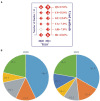Identifying the Leadership Challenges of K-12 Public Schools During COVID-19 Disruption: A Systematic Literature Review
- PMID: 35432078
- PMCID: PMC9009316
- DOI: 10.3389/fpsyg.2022.875646
Identifying the Leadership Challenges of K-12 Public Schools During COVID-19 Disruption: A Systematic Literature Review
Abstract
Globally, the COVID-19 pandemic is triggering a public health emergency and crisis on a large scale, with far-reaching effects and severe damage to all aspects of politics, economy, cultural and social life, and health. Consecutive outbreaks over the past nearly 2 years of "living with COVID-19" have forced most schools to physically close, resulting in the largest educational disruption in human history. In turbulent times of the COVID-19 crisis, school leaders are facing numerous major challenges germane to school governance and leadership. The key objective of the study is to fully explore the prospective challenges principals are encountering in public schools in times of COVID-19. To fulfill the research purpose, a systematic literature review (SLR) was carried out to investigate the leadership challenges. As a result, a total of 24 challenges were explored through SLR approach. Frequency analysis approach was initially applied to figure out the most significant challenges. Accordingly, seven challenges were found statistically significant as showing frequency ≥ 50 each. Irrevocably, the study works as a contribution to K-12 school leadership by providing guidance for current and future leaders in crisis based on practical investigation, experiences, and recommendations. Policy makers can leverage these findings to make necessary adjustments to school policy to better prepare school leaders for crisis. Additionally, the findings of the current study are believed to have profound implications for future research. These findings expand our current understanding on school leadership in time of crisis that needs further investigation. Subsequent studies can quantitatively and/or qualitatively validate these leadership challenges findings regarding a particular school context.
Keywords: COVID-19 pandemic; educational crises; leadership challenges; school leaders; systematic literature review.
Copyright © 2022 Parveen, Tran, Alghamdi, Namaziandost, Aslam and Xiaowei.
Conflict of interest statement
The authors declare that the research was conducted in the absence of any commercial or financial relationships that could be construed as a potential conflict of interest.
Figures




Similar articles
-
The influence of political disagreements and corruption on state health leader turnover during the COVID-19 pandemic in Brazil.Leadersh Health Serv (Bradf Engl). 2024 Jun 18;ahead-of-print(ahead-of-print):511-525. doi: 10.1108/LHS-01-2024-0008. Leadersh Health Serv (Bradf Engl). 2024. PMID: 38884379
-
Navigating Policy and Local Context in Times of Crisis: District and School Leader Responses to the COVID-19 Pandemic.Educ Adm Q. 2023 Apr;59(2):339-383. doi: 10.1177/0013161X231163870. Epub 2023 Apr 4. Educ Adm Q. 2023. PMID: 38602950 Free PMC article.
-
The well-being and work-related stress of senior school leaders in Wales and Northern Ireland during COVID-19 "educational leadership crisis": A cross-sectional descriptive study.PLoS One. 2024 Apr 10;19(4):e0291278. doi: 10.1371/journal.pone.0291278. eCollection 2024. PLoS One. 2024. PMID: 38598518 Free PMC article.
-
Physician leaders' cross-boundary use of social media: what are the implications in the current COVID-19 environment?Leadersh Health Serv (Bradf Engl). 2021 Jul 28;ahead-of-print(ahead-of-print). doi: 10.1108/LHS-06-2020-0040. Leadersh Health Serv (Bradf Engl). 2021. PMID: 34319016
-
Dental Education in the Time of COVID-19 Pandemic: Challenges and Recommendations.Front Med (Lausanne). 2021 May 31;8:648899. doi: 10.3389/fmed.2021.648899. eCollection 2021. Front Med (Lausanne). 2021. PMID: 34136499 Free PMC article. Review.
Cited by
-
The contribution of quality management practices to student performance: Mediated by school culture.Heliyon. 2024 Jul 19;10(15):e34892. doi: 10.1016/j.heliyon.2024.e34892. eCollection 2024 Aug 15. Heliyon. 2024. PMID: 39145037 Free PMC article.
-
Work-Related Stress of Polish School Principals during the COVID-19 Pandemic as a Risk Factor for Burnout.Int J Environ Res Public Health. 2023 Jan 1;20(1):805. doi: 10.3390/ijerph20010805. Int J Environ Res Public Health. 2023. PMID: 36613126 Free PMC article.
-
Characteristics of K-12 Teachers Considering Leaving Due to COVID-19 and for Other Reasons.J Sch Health. 2024 Jun;94(6):519-528. doi: 10.1111/josh.13452. Epub 2024 Apr 29. J Sch Health. 2024. PMID: 38684234 Free PMC article.
-
K-12 school leadership perspectives from the COVID-19 pandemic.Policy Futur Educ. 2022 Oct 22:14782103221135620. doi: 10.1177/14782103221135620. Online ahead of print. Policy Futur Educ. 2022. PMID: 40479438 Free PMC article.
-
Modeling the role of emotion regulation and critical thinking in immunity in higher education.Front Psychol. 2022 Sep 29;13:1005071. doi: 10.3389/fpsyg.2022.1005071. eCollection 2022. Front Psychol. 2022. PMID: 36248578 Free PMC article.
References
-
- Afzal W., Alone S., Glocksien K., Torkar R. (2016). Software test process improvement approaches: A systematic literature review and an industrial case study. J. Syst. Softw. 111, 1–33. doi: 10.1016/j.jss.2015.08.048 - DOI
-
- Akbar M. A., Mahmood S., Shafiq M., Alsanad A., Alsanad A. A. A., Gumaei A. (2020). Identification and prioritization of DevOps success factors using fuzzy-AHP approach. Soft. Comput. 1–25. doi: 10.1007/s00500-020-05150-w - DOI
-
- Akbar M. A., Sang J., Khan A. A., Shafiq M. (2019). Towards the guidelines for requirements change management in global software development: client-vendor perspective. IEEE Access 7, 76985–77007. doi: 10.1109/ACCESS.2019.2918552 - DOI
Publication types
LinkOut - more resources
Full Text Sources
Research Materials
Miscellaneous

